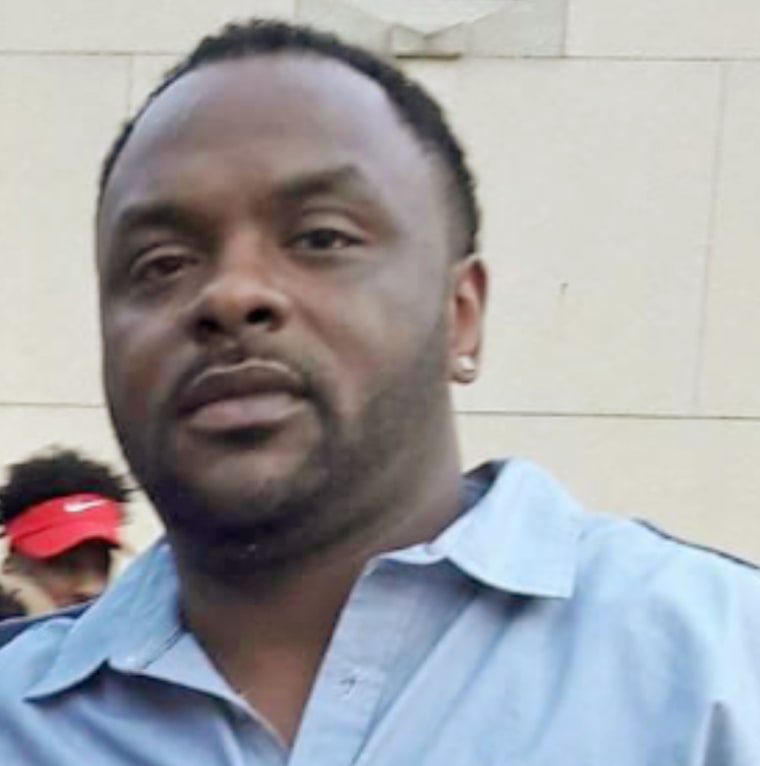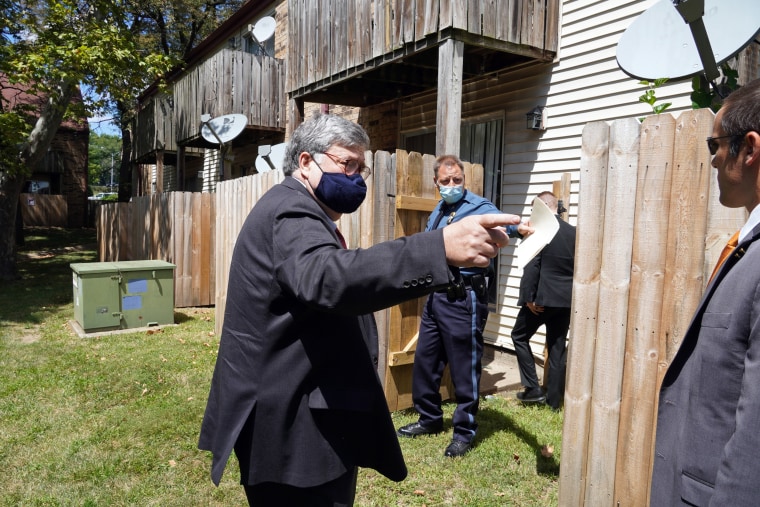The last time Denia Irving talked to her little brother, Turreze Harris, it was a Sunday three years ago. She was calling to wish hima happy Father’s Day; one of his daughters had just turned 16.
The next day, Irving learned that her brother had been shot to death early that morning south of downtown Kansas City, Missouri. "My heart dropped," said Irving, 50.
Harris, 37, was a warehouse worker, a father of four and one of a disproportionately high number of Black men to die by homicide in Missouri’s largest city in 2017. Harris' killing remains unsolved, but his relatives have grown hopeful in recent weeks that his killer might be found after the U.S. Justice Department launched Operation LeGend in Kansas City on July 8 to drive down what President Donald Trump has described as a spike in violent crime in cities across the country.
That effort, named after a 4-year-old Kansas City boy who was shot to death on June 29, aims to blunt violent crime through a surge in federal assistance: Hundreds of investigators from several agencies were dispatched to Missouri and other states to help local and state police identify and arrest suspects.
Weeks after the initiative was launched, authorities announced that they’d arrested and charged a man with murder in LeGend's death, and that dozens of other suspects had been arrested or charged with a range of violent crimes, as well as drug trafficking offenses. On Aug. 25, the Kansas City Police Department said that violent crime had dropped “significantly” in the city since the operation went into effect.

But Harris’ relatives have grown frustrated as they try to find out if his case might be solved under the initiative. And in interviews with NBC News, criminologists and advocates expressed skepticism that the effort to increase the number of federal investigators could produce such a sudden reduction in crime — or that it will do anything to solve Kansas City’s longer-term problems with violence, which hits its Black residents the hardest.
“I think it’s dangerous for them to put that out there, that the number of arrests equates to success,” said Damon Daniel, president of AdHoc Group Against Crime, a nonprofit that advocates for victims and provides trauma services. “Certainly every local police department needs to evaluate their capacity to solve violent crimes and homicides. But to say the proper approach to reducing violent crime is increasing policing is just not the answer.”
Residents aren’t asking for federal agents, he said. They want job training and mental health services. They want witness protection — a service that’s been underfunded in Missouri for years, Daniel said — and homes that aren’t dilapidated or vacant, acting as magnets for low-level crime.
Such investments, Daniel said, will yield a long-term decrease in crime and violence "because we're getting to the root causes. We're not just dealing with the symptoms."
It's not just advocates expressing skepticism. A spokesman for Timothy Garrison, the U.S. Attorney for Missouri's Western District and one of the officials leading the initiative, said Garrison “has been clear that we can’t arrest our way of the problem of violent crime.” The spokesman, Don Ledford, cited partnerships with community groups and pastors and said they’ve teamed up to tackle a range of issues related to more permanent reductions in crime.
“Whether there is a long-term change in the rate of violent crime will depend upon many factors beyond the scope of this law enforcement initiative,” he said.
Still, Ledford said the effort has produced results in Kansas City: Over the last nine weeks, homicides have fallen by 18 percent, aggravated assaults by 47 percent and robberies by 20 percent.
But Richard Rosenfeld, a criminologist at the University of Missouri-St. Louis, said those figures offer little insight into what role the surge of 200-plus agents from the FBI, the Bureau of Alcohol, Tobacco, Firearms and Explosives, the U.S. Marshals Service and Drug Enforcement Agency sent to Kansas City alone played in those declines.
And Ken Novak, a criminologist at the University of Missouri-Kansas City, said that while the statistics are encouraging, crime typically ebbs and flows. That means such a short snapshot doesn’t show how those same crimes spiked or receded over a longer period or during the same time frame in previous years.
The larger question, Novak said, is why — why would all those federal agents assisting in open investigations drive down crime so quickly and dramatically?
Novak said it’s possible that the suspects arrested under the effort would have been out committing tomorrow’s aggravated assaults. It's not a given, however, and it’s unclear who those suspects are. Of 99 people in Kansas City who the Department of Justice said have been charged with federal crimes under Operation LeGend, 60 of them face firearms-related charges. Twenty-eight were arrested for narcotics offenses, and 11 were charged with “other violent crimes.”
In a statement last month, the department said that 17 people had also been arrested on state homicide charges.
Citing Department of Justice policy, Ledford declined to provide additional details about the suspects, though he said it's “logical” that taking “violent and armed criminals and fugitives” off the streets would create "a natural deterrent effect" and make them safer.
Novak said this "feds are in town" message can indeed change people’s behavior. But he was skeptical of this theory, too, because it’s not as if authorities are saturating the streets with agents, as they did in Portland, Oregon. Instead, they’re using their expertise to investigate crimes.
“I don’t understand how cleaning up investigations produces immediate, measurable reductions in violent crime,” Novak said. “It could absolutely help in the long run. But what you’re doing now may not evidence itself for months or years.”
The hundreds of investigators deployed to Kansas City, though, has meant little in the murder investigation of Turreze Harris.
A few weeks ago, after Irving learned of Operation LeGend, she said she called the police department and asked if a “special investigator” could look into her brother's case. Her call wasn’t returned, she said, so a week later she tried again with the same result. A cousin, Anita Randle-Stanley, also called the department seeking help but hung up after she said she was placed on hold for 45 minutes. (A Kansas City police spokesman, Sgt. Jacob Becchina, said the detective on Harris’ case was never alerted to their calls but added that the detective has been in “regular contact with immediate family.”)
The family believes there are solid leads that local authorities haven’t properly investigated. Witnesses told the family that the killing occurred after Harris got into an argument with his girlfriend. One man who saw the shooting and talked to Harris' mother, Diane Harris-Faine, said that the girlfriend was there when he was shot to death. But the girlfriend denied this to authorities and left Kansas City, relatives said. (Efforts to reach her were unsuccessful.) Harris-Faine said she told this to the detective, Daniel Frazier, who responded by saying there’s a difference between being a witness and being an accessory.
“I said, ‘but she told you she wasn’t even there,’” Harris-Faine recalled.
Becchina didn’t respond to a request to make Frazier available for an interview, nor did he dispute Harris-Faine's characterization of Frazier’s comment.
“Detectives have done as much as they can to this point," Becchina said. “They know more people were there and they need those people to come forward with the Information.”
Daniel, of AdHoc Group Against Crime, said that Harris’ case and others like it point to another, perhaps deeper, problem with Operation LeGend: The officials running it haven’t communicated to victims’ families which cases are being investigated. Whatever criteria they’re using, Daniel said, they need to express it clearly to help “manage expectations.”
“If they’re not doing cold cases, then folks don’t have to worry,” he said.
Asked about how authorities are selecting cases to investigate, Ledford said that federal agents were only there to assist local law enforcement agencies. He said questions should be directed to them. Becchina, however, said the Department of Justice is focused on curbing “on-going violence” and if time allows, federal authorities will probe older cases on a “case-by-case basis.”
Ledford said there is no time frame for Operation LeGend, but he described it as a “temporary, targeted initiative."
For Irving, the seeming lack of clarity and urgency from authorities has led her to consider renting a billboard about her brother, as the character played by the actor Frances McDormand in the movie “Three Billboards Outside Ebbing, Missouri,” did to spotlight her daughter’s unsolved murder.
Irving said she’d include a nice picture of Harris and mention the reward being offered in his case. She'd also include a message: “Why hasn’t there been any progress in this murder case?”
